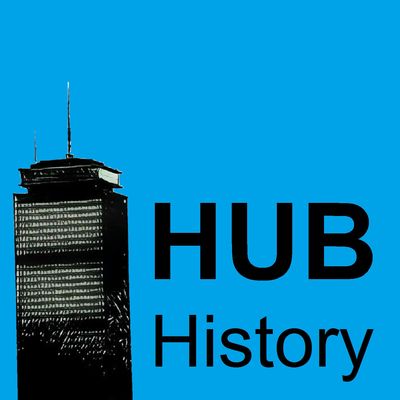Where two history buffs go far beyond the Freedom Trail to share our favorite stories from the history of Boston, the hub of the universe.
http://HUBhistory.com
Richard T Greener and the White Problem (episode 217)
Professor Richard T Greener grew up in Boston in the shadow of the abolition movement, graduated from Harvard, and became one of the foremost Black intellectuals of his era. However, soon after publishing his most influential work, when it seemed like he would take up the mantle of Frederick Douglass, he instead sank into obscurity. He was nearly forgotten for over a century, until his legacy was rediscovered in 2009 in a discarded steamer trunk in a dusty attic on the South Side of Chicago.
Please check out the transcript and full show notes at: http://HUBhistory.com/217/
And support the show on Patreon.
Richard T Greener and the White Problem- Michael David Cohen’s profile of Greener for the AAIHS
- Sophia Liang’s profile of Greener in the Harvard Crimson
- Cole, Lady June & Cole, Bruce. “Richard T. Greener and the Golden Age of African Americans In Higher Education.”
- Blakely, Allison. “Richard T. Greener and the ‘Talented Tenth’s’ Dilemma.” The Journal of Negro History, vol. 59, no. 4, 1974
- Gardiner, Charles A., John T. Morgan, Frederick Douglass, Z. B. Vance, Joel Chandler Harris, Richard T. Greener, Oliver Johnson, S. C. Armstrong, J. H. Walworth, and J. A. Emerson. “The Future of the Negro.” The North American Review 139, no. 332 (1884)
- Address of Frederick Douglass to the National Convention of Colored Men, Louisville KY, September 24, 1883
- “The White Problem,” Richard T Greener, 1894
- Despatches from United States consuls in Vladivostok, 1898-1906. Washington [D.C.]: National Archives
- “Personal Reminiscences of Frederick Douglass,” Richard T Greener
- Chicago Sun-Times article about rediscovering Greener’s papers
- Header image
In 2017, Dr. Katherine Chaddock of the University of South Carolina, Greener’s old school, published the book Uncompromising Activist: Richard Greener, First Black Graduate of Harvard, the first book-length biography of Greener and our first Boston Book Club pick since October! Her publisher says,
His black friends and colleagues often looked askance at the light-skinned Greener’s ease among whites and sometimes wrongfully accused him of trying to “pass.” While he was overseas on a diplomatic mission, Greener’s wife and five children stayed in New York City, changed their names, and vanished into white society. Greener never saw them again. At a time when Americans viewed themselves simply as either white or not, Greener lost not only his family but also his sense of clarity about race.
Richard Greener’s story demonstrates the human realities of racial politics throughout the fight for abolition, the struggle for equal rights, and the backslide into legal segregation. Katherine Reynolds Chaddock has written a long overdue narrative biography about a man, fascinating in his own right, who also exemplified America’s discomfiting perspectives on race and skin color. Uncompromising Activist is a lively tale that will interest anyone curious about the human elements of the equal rights struggle.
Upcoming EventEveryone knows Paul Revere’s famous engraving of the bloody massacre on King Street that helped cement the Boston Massacre in American memory. It’s easy to find copies of the engraving, and you can even see the original copper plate Revere etched to create the engraving from at the Commonwealth Museum in Dorchester. But did you know that Paul Revere staged an elaborate visual spectacle to commemorate the first anniversary of the tragedy? I’ve always imagined that in the days before television and movies, his Massacre illumination would have been transfixing. Our friends at the Paul Revere House write,
The Paul Revere House is excited to present a commemorative reimagining marking the 250th anniversary of Paul Revere’s Boston Massacre illuminations.
On March 5, 1771, Paul Revere used his recently purchased home to keep the memory of the Boston Massacre and opposition to the British occupation in Boston fresh with a series of three illuminations displayed in the windows facing North Square. According to contemporary reports, thousands streamed by his house in silence to witness the spectacle which was a key link in the Revolutionary chain between the Boston Massacre and the Boston Tea Party.
Our virtual program offers footage of a local artist’s reimagining of the illuminations, descriptions from period newspaper accounts, and an in-depth panel discussion with Revere engraving expert, Prof. Nancy Siegel, and Boston Massacre scholar Prof. Serena Zabin to add context and color to this incredibly significant event.
There’s a $10 suggested donation with your registration, and the video will debut at 6:30pm on March 5, the 250th anniversary of the illumination and 251st anniversary of the Massacre.
